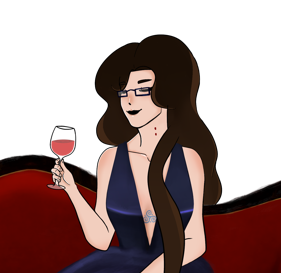Evelyn Silver's Blog
August 12, 2025
Vampire’s Queens (The Bloodline Chronicles 3) Release Date!
The final book in the main trilogy of The Bloodline Chronicles has a release date just in time for Halloween!
Vampire’s Queens will be released on October 27, 2025.
You can preorder an ebook on Amazon now; stay tuned for updates!
Sarai, Marcelle, and Setanta’s reign as the queens and king of the secret vampire kingdom of New Ulster has begun.
The duties of a queen consort are straightforward. For the witch Sarai, it means studying vampire law and history, knighting a bodyguard, growing an heir, and discovering what it means to have a family. All the while, a creeping thirst itches her dry throat with its bloody implications as she lusts for new sustenance. For the vampire Marcelle, it means trying to figure out who is tipping off the vampire hunters she’s meant to be eliminating. The lovers must brace themselves against plots spinning around them, or everything may go up in flames.
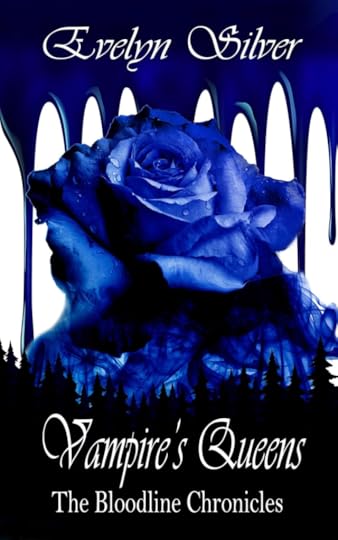
July 11, 2025
The Murderess: Marcelle’s Origin, a Short Story
Here’s a little something I’m working on! It might become Chapter 1 in a novella or novel about my character Marcelle’s origin story one day, or it might stay a short story. At this point in the tale, she is still a human known as Marie de Noir. This is the very first meeting between her and her future vampire sire and lover, Setanta.
The Murderess1453: Paris, France
Marie de Noir had never killed anyone before and found the experience to be different from anything she had ever imagined. She would have thought it would make her feel horrid, that the guilt of violating one of the most important ten commandments would eat at her soul. Yet, as she looked down at the unblinking eyes of the dead man in her best friend’s bed, she felt no guilt at all.
“Oh please no,” whispered Charlotte, gripping her brown hair in a white-knuckled grip. “Marie, is he dead?”
“I don’t think he’s likely to recover from a knife to the throat,” Marie said. She looked down at the blood covering her hands and the bed sheets. It looked so bright red against her pale skin. She’d never seen quite so much blood in one place, not even when she’d once broken another working girl’s nose and it had gushed blood that rushed as freely as the Seine. No, the dead man’s blood was so much more than that, pooling and soaking into the bed.
Charlotte coughed, bruises already forming along her throat where the client had attempted to choke the life out of her.
“What do we do?” she managed to wheeze. “If anyone finds out…”
“They won’t find out,” Marie reassured her. Though she wasn’t quite sure how they wouldn’t find out. She glanced out the window. It was nearly sunrise, though not quite yet. Most of the girls had finished with their clients and gone to bed. Girls didn’t work in the mornings, so that was when they slept. Most of Paris didn’t begin to bustle until the sun was up. “We must be rid of him before sunrise.”
“How?” Charlotte whispered.
Marie stood up straight as she tied the waist-length, black hair she was named for back and out of her face so she could set herself to the task easier. “Help me.”
Together, they rolled the man up in the bloody blankets from Charlotte’s bed and Marie checked outside their room. No one was coming, and the halls were still. She took a few steps out and checked down the hall and the stairs to the main room. There was a back door, and no one was in their way. She rushed back to the room and wrapped her arms around the dead man’s legs, heaving him up.
“Get the head,” she instructed, and a shaking Charlotte obeyed.
“If anyone sees us-”
“Then we’ll be quick and quiet,” Marie snapped.
They managed to half drag the man through the hall, down the stairs, and out the back without being caught, to Marie’s great relief. There was a cart there, an empty one. It had no horse, but that was fine. They were strong enough together.
“Put him here,” Marie said. They grunted and thrust the deadweight into the back of the cart, then sunk together to the floor, their chests heaving with the effort.
“Now what?” Charlotte whispered. “We’ll hang if we’re caught.”
“We have to get rid of him.”
“How?”
Marie thought for a moment. “The Seine. We’ll toss him in the river. Even if someone finds him, they won’t know who did it. No one will know it was us.”
“You. It was you,” Charlotte murmured.
Marie stared at her, at the bruises shaped like a dead man’s fingers on her friend’s neck. “Would you have rather I let him kill you?”
“No. No, I didn’t mean…”
“We’re in this together, Charlotte. Now help me pull this cart to the river.”
They got a sack meant to hold onions, stuffed him into it with some trouble, then covered the cart with a cloth and began to pull together in silence towards the river. Marie could hear the waters lapping at the banks as they got closer to a bridge overlooking it, sticking to alleys as they did. It was quiet, and still so dark that no one was out. No one but those who had unsavory business to tend to.
Then, a shadow moved. Not a shadow, no. It was a man whom she hadn’t realized was there in the first place. As he stood tall, he towered over them, and looked very distinct with red hair bright as copper under his feathered hat.
Charlotte took one look at the man and bolted, leaving Marie alone in the night with a body and a stranger. Oh, she would have words with that woman when she returned to the brothel.
“Quite the supportive friend you have,” the red-haired man mused as he watched Charlotte flee into the darkness.
Marie said nothing, but analyzed him quickly as she would one of her clients. He had a thick accent from a land she didn’t recognize, but that wasn’t important. What was important was that he was rich, and a noble. Sumptuary laws forbade common folk from wearing the fabrics he wore, though in the privacy of a brothel many girls had something special not meant for their class to wear for clients, such as a proper girdle. Not only was he permitted by law to wear velvets and silks in public, but he had the means by which to afford jewels and gold, as evidenced by a star ruby set in gold on his finger and the strangely designed golden torq necklace with the heads of hounds on the ends of it. His clothes were clean, and so were his shoes at a quick glance. She doubted he had ever worked a day in his life. She noted a dagger at his belt with a hilt shaped in the head of a hound or wolf similar to his necklace and wondered if he’d ever even used the thing. It looked decorative. Good for slicing cheese and apples, less so for slicing necks.
As she made her appraisal of him, her gaze swept upward to his face, and her heart nearly stopped. Marie had never seen eyes that shade before. Crimson, just like the blood that had spurt from her victim. His face was uncomfortable in its beauty, as if it were unnatural. There was something too smooth, too perfect about his features. Marie had never seen a more attractive man and it terrified her. No wonder Charlotte had run. She gulped.
“Is there something I can help you with, Monsieur?” she asked, plastering a smile on her face to hide her terror.
“No. Though it seems there may be something with which I can help you.” He nodded toward the cart behind Marie. She kept smiling.
“I assure you, Monsieur, I have no need of assistance,” she said.
“No need to lie to me. There is death in that cart,” he said casually.
Her heart caught in her throat as he walked behind her and lifted up the cover, then untied the sack to reveal the dead man’s face. “What did this fellow do to deserve such a fate?” he mused.
Marie’s smile disappeared and she tried to keep her breathing steady so that she wouldn’t faint. “Will you call for the guard?”
“Answer my question, and we’ll see.”
She glared at him. “He attempted to kill my friend. I killed him first.”
“Is that so?” he asked.
“It is.”
She couldn’t read his face as he stared at the corpse, then turned those terrifying, unholy red eyes on her. Marie’s heart kept racing and racing, yet she knew she had to do something. Her life was at stake.
“I can pay for your discretion,” she said, forcing the smile back on her face in a manner practiced to entice men.
“I have no need of your gold,” he dismissed.
“I do not speak of gold, Monsieur.” She stepped closer and in a stroke of boldness, ran a finger down his boat-neck shirt and velvet doublet decorated with black and gold embroidery. She tilted her head to the side in a most coquettish fashion and raised one eyebrow just so in a practiced expression of invitation as her fingers lingered at his belt. He looked down at her in utter amusement.
“You’re a very brave young woman,” he said. “And while I appreciate the offer, I have no need for such payment.”
“Your wife will never know,” Marie promised, and let her painted, red lips part just slightly, open with a practiced promise of sensuality.
“I have no wife. I simply have no need for what you offer,” he said. He took her hand in his to remove it from his belt, and as he held up her hand she made a startling discovery: his skin was cold. Not as cold as the corpse in her cart, but unusually cool, like tea left out at room temperature.
Marie glared at him and pulled her hand away. “Then if you’ve no need of payment, either call the guard to see me hang or be on your damned way.”
He chuckled. “Are you going to throw him into the Seine just like that?”
“Yes. Is that a problem?”
“It is.” He unsheathed his dagger and before Marie could react, he’d stabbed the corpse, twice. “If you do not puncture the lungs, then he will float up to the surface and be discovered. I recommend filling the sack with rocks as well.”
Marie raised an eyebrow. Perhaps his knife was good for more than cheese and apples after all. “Is this something you have familiarity with then, Monsieur?”
“A passing familiarity, perhaps,” he replied. “He seems heavy for you. Would you like assistance?”
Marie didn’t say anything, so he simply picked up the handles of the cart and began to walk toward the river. “Might I know your name?” he asked.
“Marie,” she replied.
“Marie,” he repeated. “Not a name that suits you. You’re named for the Madonna, yet you cart around a freshly killed corpse, wear the garb of a harlot, and tug at the belts of strange men in the dark of night.”
“Marie Magdalene was a whore,” she said with a shrug. “Perhaps I’m named for her.”
“I doubt Marie Magdalene ever slit a man’s throat,” he said.
“Then perhaps I am named for the Roman god, Mars,” she retorted.
“Mars?” he said, and laughed. “What do you know of Mars?”
“Not much. I knew a man who loved to talk of stars and their names once. He went on and on about each of them, and I didn’t mind as long as he paid for my time. So, I know of Mars, the wandering light in the sky, named for a pagan god of war.”
“The color red does suit you well. Mars. A little Marcelle.”
Marie grinned a little. “Perhaps that does suit me better. Unfortunately, my clients prefer the name of a whore to the name of a pagan war god. Priests in particular seem fond of it when they fuck me. They repeat it like a prayer.”
“How deliciously blasphemous.”
“You have yet to tell me your name, Monsieur. If you’re to know mine, I should know yours. It is only fair.”
“It is, isn’t it?” He stopped. “I’ve had several names. Which one should I tell you?”
“The one you were christened with,” she suggested.
“What if I was never christened?”
She paused and looked at him oddly. “You do not look like a Jew. Nor dress like one.”
He shook his head. “No, I am not.”
“You speak strangely. Where are you from?”
“Ireland,” he replied. “Do you know where that is?”
“No,” she said.
“It is an island, across the sea to the west of England.”
“I know where England is,” she said. “And I know their people fear God, even if many English are Protestants. Have you no Christian name, Monsieur?”
“I have a name I use with Christians here in France,” he replied. “Jean de Bourbon.”
Marie’s eyes widened in shock. It was the same noble house as royalty. She did not know a Jean specifically from the house, but knew the familial name well enough. “De Bourbon? But… with your accent. And you are not French.”
He grinned, and said in perfect French without a trace of an accent, “I can be when I wish to be. I can be anyone I wish to be. Looking as distinctly I do, I try to find some ways to blend in wherever I go.” He dropped the accent. “I simply feel no need to put on a pretense with a murderess in the wee hours of the morning.”
“You were not born Jean de Bourbon,” she accused. “You’ve forged your way into a noble home?”
“No forgery was involved,” he promised. “My papers are all legitimate, at least as far as the crown is concerned. Whatever I may be, at least I have the right scribbles on a page to legally mark the identity I wish to steal, with cooperation from the house in question.”
“Then what name were you given at your birth?” she demanded. “You are not French.”
He put down the cart at the edge of the Seine and looked at her. “You really are quite persistent. I tell you I am connected to the house of Bourbon, I stand here looking as I do, and you do not flinch to make demands of me. You haven’t been afraid of me since I punctured your corpse’s lungs.”
“Should I be?”
“Oh yes. You should be,” he murmured. “But since you are not, I’ll grant your request. My name is Setanta, son of Lugh. Others know me as CuChulainn, but my name at birth was Setanta.” The way he said his names made her think he meant for her to recognize them. But they held no weight for her, so made no difference.
“Well then, Monsieur Setanta,” Marie said. “I’d say it is a pleasure to meet you, but I haven’t decided if it is yet.”
“It is quite the pleasure to meet you, my little Marcelle,” he teased, and picked up several heavy cobblestones with ease, throwing them in the sack with the corpse. She noticed with some discomfort how easy it was for him to rip up the stones, like a child playing with wooden blocks. Perhaps she was wrong in her assessment that he’d never done a day’s work in his life.
“Why are you in Paris, Monsieur Setanta?” she asked.
“Why not?” he replied. “I enjoy exploring the world from time to time. Finding amusement. The French court is very amusing, I must say. Very lively on most days. Though it’s begun to tire me, and I’m sure I will return to Ireland one day.” Setanta picked up the corpse and stones in their sack as if it were nothing more than a rag doll and heaved it into the River Seine, where it sank down to the bottom.
“Are you a solider?” she asked. “Most nobles could not pick up a person with such ease.”
“You could say that I have been,” he replied, then looked at her. She held her breath as he reached forward and brushed hair back from her face behind her ear. It was such a small movement, yet so intimate. “If I wished to see you again, where would I go?”
Marie raised a coy eyebrow. “I thought you had no need of my services?”
“I don’t. But perhaps I’ve enjoyed your company tonight.”
Well, Marie was never one to turn down a wealthy client. “I work at Madame de Coeur’s brothel, the Red Cat,” she replied. “Ask for Marie de Noir when the red lanterns are lit at sunset. I’ll give you a discount for your first night as thanks. If you want company for any additional nights, you pay in full like anyone else.” She eyed him suspiciously. She could usually tell what sort of appetite a man had from interacting with him, but it was hard to read this Irish man. “If you have any more peculiar tastes, I charge double,” she added. “And any actions like those of the man you just threw to the water will earn you the same in kind.”
Setanta threw his head back in open laughter so loud she was afraid he would wake all of France, wiping tears of amusement from his eye. “My. It’s been a while since someone threatened to kill me.”
“As long as you do not try to kill me, we have no quarrel,” Marie replied.
“Then, I shall not try to kill you,” he said. He removed his feathered cap, held it to his chest, and bowed to her. It was a low bow, one of respect meant for a class much higher than hers. “Until we meet again, my Marcelle.” He put back on his cap and strode off into the waning night.
***
No AI was used in the making of my writing and it never will be.
If you enjoyed this post, give a like and follow for more content, and leave a comment with your thoughts!
Be sure to check me out on Instagram, TikTok, Bluesky, YouTube, or Facebook and check out information on my adult paranormal romance novel series, The Bloodline Chronicles.
Stay tuned for updates regarding the upcoming third and final installment of my series, Vampire’s Queens (The Bloodline Chronicles 3)!
If you’ve read my books, please leave reviews on Amazon and Goodreads – it helps me so much, and my goal is 50 reviews on Amazon so that Amazon will help promote my work to more people. We’re getting there!
Linktree assorted social media available here.
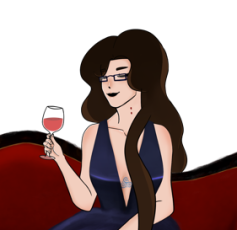
March 24, 2025
Vampires, Queers, and Jews: Why I Love the Horror of Power
Vampires are always symbolic of the outsider, the Other, the ones who are different. The ones that the good, pure folks of the town clutch their pearls when they see them, as they fear that the monsters will destroy all things decent about society. Vampires are foreign, they are queer, they are not us. And the most terrifying thing about a vampire is that, unlike real life minorities, they have power. The same power that our persecutors used to have (and in some places still do have) over us to inflict hell on our minds and bodies.
Interview with the Vampire is gay.
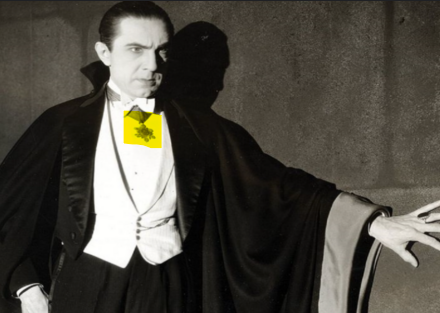
Bram Stoker’s Dracula is negatively Jewish coded with harmful stereotypes (foreign, blood libel myth, hook nose, heavy similarities to a dybbuk, sexually predatory, etc.) and presents gender non-conformity. The Jewish coding is so heavy that the Bela Lugosi film actually has Dracula wearing a six-pointed star.
True Blood attempts to make a very non-subtle comparison between vampirism and queer rights. God Hates Fangs, Coming out of the coffin, etc. (This analogy falls apart if you think about it too long because queers aren’t monsters who need to feed on the blood of straight people to live, but hey, they tried.)
You get the picture.
As someone who straddles the intersection of queer and Jewish identity, this has “me” written all over it. But why would I love and write fiction based on something meant to provoke fear of my existence?
While in cases like Dracula, this otherness was meant to be horrific, I think that otherness is why many of us who are actually “others” love vampires so much. Not because of the horror attempted to be conveyed on the page in older vampire stories, but because we see ourselves there and realize that a story exists where we have power. It’s the same reason why queer communities latched onto over-the-top queer-coded Disney villains like Ursula and Jafar as icons. Yes, the evil beings get defeated in the end… and the representation certainly has problematic points. But maybe we can pretend. Maybe we can imagine a world where we get the power for a change and don’t have to hide who we are. Because in real life, even though some people who aren’t very smart *think* there’s some sort of secret Gay Agenda or Protocols of the Elders of Zion, there isn’t. We
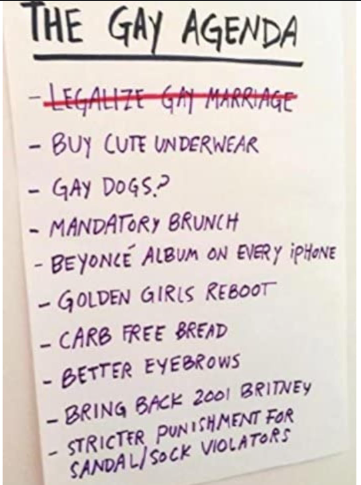
historically have had no power, and still struggle to make our voices heard today.
But Vampires aren’t just powerful minorities: they’re survivors [sort of] of dead societies and eras that are gone. They’re the last “living” memory of the Black Plague, of the fall of the Roman Empire, of the rise of Egyptian pyramids. This speaks to me as a Jew, especially as a Jew with Holocaust survivor grandparents, and as a Jew who went to a Jewish school were I was passed on the history, memories, and stories of my people handed down through countless generations. I can’t think of anything more Jewish-coded than representing an ancient civilization and clinging to that memory. It also speaks to me as a queer person, when I look at ancient indications of queer identity and see modern archeologists and anthropologists pull up the “they were roommates” bs, erasing true history of queer people who have always existed.
It might be weird for me to be so in love with vampires given their problematic history connected to harmful Jewish tropes. The image of Dracula’s brides tearing
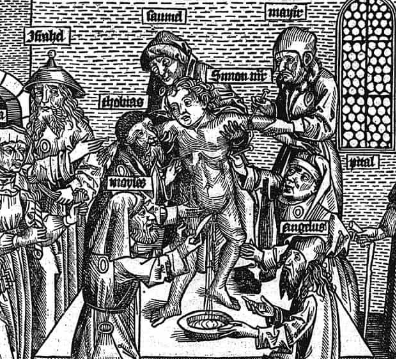
apart a child isn’t dissimilar to that one medieval picture made to depict the lie that Jews cut up and kill Christian children to make matzah. Dracula has “oriental” features once ascribed to “oriental” Jews, who were the descendants of exiles from Judea that’s technically in Asia – most prominently, the large nose stereotype commonly found in individuals of Middle Eastern heritage. Aka, Dracula has a “hook nose”. Jews were thought to be a parasitic drain on the soul of European societies, much like a vampire literally drains the blood and soul of their victims, and both were described in nearly the same verbiage by some 19th century writers. There’s even a line in Chapter 17 of Dracula that states: “There was dust that thick in the place that you might have slep’ on it without `urtin’ of yer bones. An’ the place was that neglected that yer might `ave smelled ole Jerusalem in it.” I mean, how much louder does the dog whistle have to get before it’s just a whistle?
But people have moved on a little since the original Dracula. People tend to humanize the Other now.
I think, perhaps I love vampires because they were coded to me. To demonize me, of course, but there wasn’t much mainstream representation back in the old days beyond Shakespeare’s Merchant of Venice so like queers with Ursula, it’s not unreasonable to take what you can get at that point in time. I see the dog whistles next to the demonization and I think… but what if the vampire wasn’t evil, just like I’m not evil? What if… they’re just me with the power to stand up to the world and be themselves?
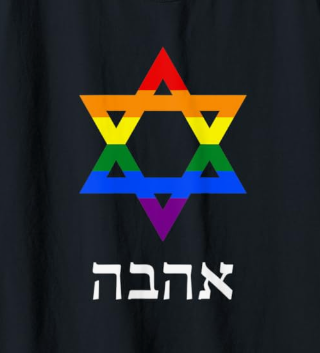
What if I had the power to be myself openly without being hunted or hurt for it? To wear my gay Star of David Ahava shirt without fear of either antisemites or homophobes?
Old vampire stories may exist to warn us Others that we will be hunted and killed if we step out of line, if we reveal ourselves too fully. Their horror exists to titillate and terrify mainstream respectable society by imagining minorities with the power to inflict the horrors they’ve inflicted on us back at them.
Modern vampires exist to allow power fantasies and romances. People want to be vampires, or be with vampires, or both. The Others are now Hot. We’ve gone from horror to forbidden lust to being mostly socially acceptable in our existence (even if there’s been some backsliding in progress in recent years). The horror still exists, but are we really horrified by it? No, we want it. We crave it. Because it gives us power. And you know something, that’s kind of fun to pretend we have in a fantasy book. It’s a quiet wish fulfilment to pretend we don’t have to be nice to bigots or our oppressors and can indulge in a morally grey or even pitch black attitude without judgement. And I think, that’s why I love the horror of power and vampires.
If you enjoyed this post, give a like and follow for more content, and leave a comment with your thoughts. Be sure to check me out on Instagram, TikTok, Bluesky, YouTube, or Facebook and check out information on my adult paranormal romance novel series, The Bloodline Chronicles.
Stay tuned for updates regarding the upcoming third and final installment of my series, Vampire’s Queens (The Bloodline Chronicles 3)!
If you’ve read my books, please leave reviews on Amazon and Goodreads – it helps me so much, and my goal is 50 reviews on Amazon so that Amazon will help promote my work to more people. We’re getting there!
Linktree assorted social media available here.
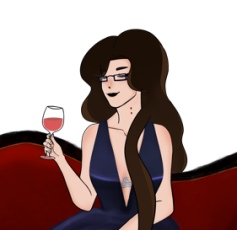
March 20, 2025
Bewitched Blooms – sub+Human Update
I’ve been fortunate enough to be able to join a group of amazing fellow authors in putting together a charity anthology! My short story, sub+Human is now a 25,000-word novella to be published alongside many other amazing works by many amazing writers in Bewitched Blooms, with a release date of March 25, 2025.
Come preorder today! I’m looking forward to everyone reading these amazing stories.
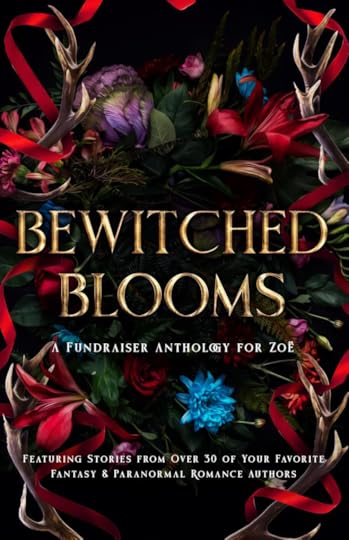
A little background: the original story for sub+Human was inspired by a late lover of mine who passed away due to cancer. He loved the short story and after he passed, it developed into a novella. However, I never felt right publishing it for profit, due to the nature of its conception. When I saw this charity anthology to benefit someone struggling with cancer and to be donated to cancer charities, I knew it was the perfect fit for this story. I have not decided if once the anthology has run its course if I’ll publish the novella on its own yet, so this may be your only opportunity to read this story. Go get your copy!
sub+Human is an Orpheus and Eurydice reimagining that takes place in the same world as my published books, but all new main characters from a different part of society. The story follows a girl named Carmen when she’s turned into a vampire after a car crash. But, not just any vampire. She’s an incredibly weak vampire, that stronger and older vampires barely count among their number, and she’s warned by her also very weak maker to avoid them. As she learns to feed, she ends up encountering a man named Forrest for a night of passion that turns bloody when she loses control, but luckily he’s as understanding about it as one can be, and she assumes she’ll never see him again. Years later, they meet each other again by chance and begin a very steamy and kinky D/s relationship. All is fun and games until he’s diagnosed with cancer, and Carmen’s blood is too weak to save or turn him. She has to brave the world of ‘real’ vampires and beg for someone to save him for her, or he’s doomed to die.
If you are interested in an ARC copy of my contribution so that you can leave a review for sub+Human on Amazon and Goodreads, please reach out via my contact form!
If you enjoyed this post, give a like and follow for more content, and leave a comment with your thoughts. Be sure to check me out on Instagram, TikTok, Bluesky, YouTube, or Facebook and check out information on my adult paranormal romance novel series, The Bloodline Chronicles.
Stay tuned for updates regarding the upcoming third and final installment of my series, Vampire’s Queens (The Bloodline Chronicles 3)!
If you’ve read my books, please leave reviews on Amazon and Goodreads – it helps me so much, and my goal is 50 reviews on Amazon so that Amazon will help promote my work to more people. We’re getting there!
Linktree assorted social media available here.

February 28, 2025
Do I Write Smut?
Someone told me that they found my book, Witch’s Knight, on a shelf of a bookstore under the erotica section. It’s not the first time Witch’s Knight has been classified as erotica, though I personally don’t consider it as such. Honestly, I was just thrilled they found my book in the wild on real bookstore shelves! But, to me, erotica has to be focused primarily on the sex to qualify as erotica. Like, cover to cover, the whole point is sex. I’ve read some books like that, where every other page is another sexual scene. I like some books like that and support authors who write them.
But… my books aren’t like that.
Witch’s Knight (The Bloodline Chronicles 1) has one sex scene. I’m proud of it, absolutely, and I love it, but it’s just one.
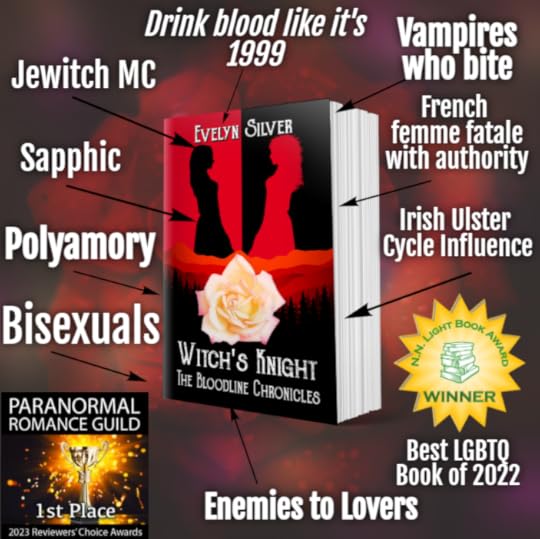
One. Uno. Achat. Yi. Hana. Une. Eins.
ONE.
It is a single chapter lasting 12 pages in a print book of 296 pages. For those inclined to do the math, that’s 4.05% of the book.
That means that 95.95% of Witch’s Knight has to do with vampire and witch politics, uncovering the secrets hidden by vampires, working against witch/vampire hunters, rival witch clans, violence, dealing with bad vampires, learning about the secret vampire kingdom, learning tragic/dramatic backstories, and building up tension romantic and otherwise between characters… but that 4.05% of my book negates everything else I wrote. Now it’s “just” smut.
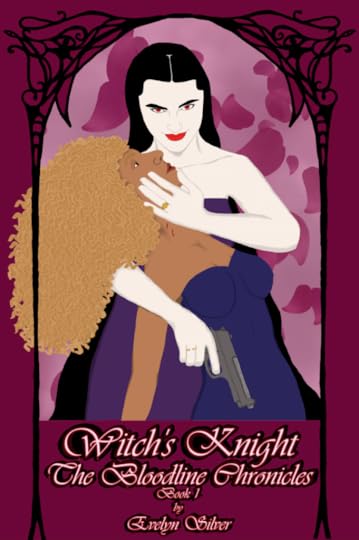 This is an alternative cover I made for Witch’s Knight (The Bloodline Chronicles 1) featuring my main characters, Sarai and Marcelle. It is not the official cover.
This is an alternative cover I made for Witch’s Knight (The Bloodline Chronicles 1) featuring my main characters, Sarai and Marcelle. It is not the official cover.In my second book, Midnight Fear (The Bloodline Chronicles 2) it gets a little more intense. In the print copy, there’s about 27 pages of sexual content. The book is 348 pages long. So, because of 7.76% of my book’s content, the whole book is smut. 92.24% of Midnight Fear is about international vampire politics, a coronation and associated grand ball, violence, dangerous vampire/witch hunters, a ghost haunting, a neo-nazi witch clan, summoning an extra-planar demon/spirit thing, sibling rivalry, vampires learning to work with witches and the reverse, building tension between characters… but that doesn’t matter. 7.76% of the book has to do with kink or sex. So, the whole book is smut.
Do you have any idea how much fucking research I have to do to write a character taken from ancient Irish mythology and do him justice?
How much research I need to do to write a main character who is a vampire originating from a brothel in Paris, France in the early 1500s?
How much research I need to do to write a side character who is a Mi’kmaq Native American and not screw it up?
A side-character couple who are an interfaith Jewish-Muslim lesbian couple with a daughter? (Believe me, that one is a doozy to navigate right now, even more than usual)
An international cast of ancient vampires that are represented well?
But sure, all I write is silly little smut stories for people to get off on.
It drives me nuts that I put all this effort into crafting these storylines, creating intrigue, researching historical events and time periods, learning about all these little things I need to build a comprehensive story… and then get the entire book labeled erotica over 4-7% of its content. That’s not to say that outside that 4-7% there isn’t romantic build up and tension… after all, that’s what makes that 4-7% so satisfying. But that’s all the real ‘smut’ there is. And because of that, my friends and family jokingly refer to my writing as smut. Which, sometimes I join in with the joke, I know it’s good natured, but… it simply isn’t true, from my point of view.
I like to say that my book isn’t erotica, but it has elements of erotica. It also isn’t horror, but it has some elements of horror. It’s bisexual adult paranormal romance. And there’s so much going on in it that I even have heterosexual, monogamous fans who have messaged me that they’re invested in what happens next despite not being the target audience.
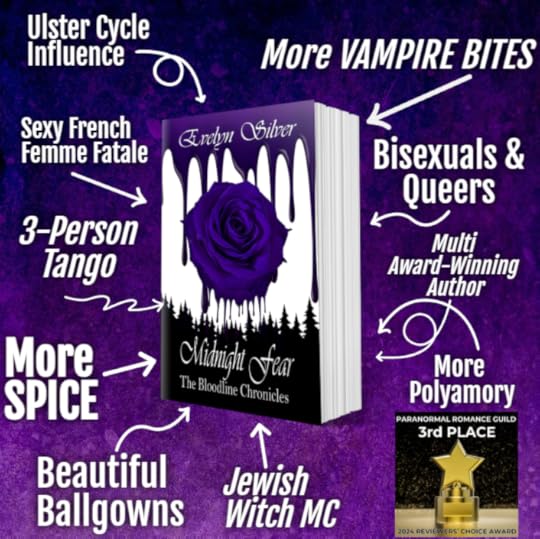
This isn’t a critique of books that are super smutty, by the way, don’t misunderstand me. I like silly little smut stories that exist just for pleasure. I think they need to exist. I like those stories that are cover to cover sex because why shouldn’t we enjoy ourselves? It’s worth noting that men never have to reach far to access material catering to their sexual desires, but once women and other non-men have even a sliver of something they claim for their pleasure, that gets demonized. Why shouldn’t we prioritize pleasure in a narrative without punishing the characters who experience it? That’s all part of why I include the sex scenes in the first place. Why can’t we have a genre where women and femmes having sex isn’t a likely death sentence? But then… any book that has a HEA (Happily Ever After) and a single sex scene is written off as ‘porn’, ‘smut’, or ‘silly’ by far too many people.
Why do we do that? It’s simply inaccurate, and it reduces all the hard work that goes into building these intricate worlds and characters to… just sex. But there is so much more.
Even the big-name popular books get this treatment. Fourth Wing? Dragon rider smut. A Court of Thornes and Roses? Fairy smut. Bride? Vampire/Werewolf smut. The percentage of smut to the rest of the narrative in these books is so slim, yet… those few scenes make it smut. Never mind the expansive fantasy maps, the intricate worldbuilding, the political intrigue, the wars… No, the main characters have sex and focus on some romance, and the books’ target audience is women and they’re written by women, and that makes it “silly little smut books”.
I really want you to think about those percentages in my books again.
Witch’s Knight: 4.05% sexual, 95.95% not sex = smut
Midnight Fear: 7.76% sexual, 92.24% not sex = smut
Make it make sense.
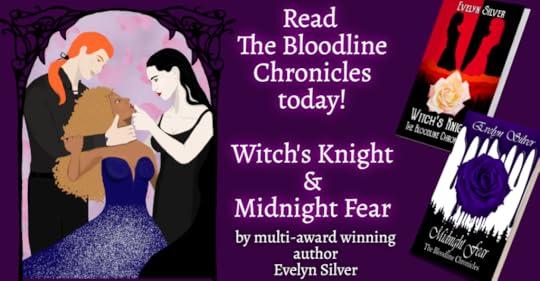
If you enjoyed this post, give a like and follow for more content, and leave a comment with your thoughts. Be sure to check me out on Instagram, TikTok, Bluesky, YouTube, or Facebook and check out information on my adult paranormal romance novel series, The Bloodline Chronicles.
Stay tuned for updates regarding the upcoming third and final installment of my series, Vampire’s Queens (The Bloodline Chronicles 3)!
If you’ve read my books, please leave reviews on Amazon and Goodreads – it helps me so much, and my goal is 50 reviews on Amazon so that Amazon will help promote my work to more people. We’re getting there!
Linktree assorted social media available here.

April 10, 2024
Midnight Fear (The Bloodline Chronicles, 2), Now Released!
Be sure to check out my newest book, Midnight Fear (The Bloodline Chronicles 2)! Read and review if you’re inclined, I’m just excited to be able to offer it to everyone!
Even the strongest of vampires has a breaking point: for Marcelle, it was being tortured by a witch in New York and trying to return to her regular existence as if nothing had happened.
She has too much to do to allow herself to focus on something as trivial as trauma. Occult hunters accost her witch allies; an aggravating pyromancer needles a fiery thorn in her side; and the coronation of one of her lovers, the vampire crown prince of New Ulster, Setanta, has her full attention. Not only that, but her newest lover, the necromancer and healing witch Sarai, has trials of her own to face and a reckoning to come with her formal introduction to the vampire royal court at the Midnight Festival. Marcelle and her lovers must face the demons of the past and future, or she may lose the new love desperately needs.
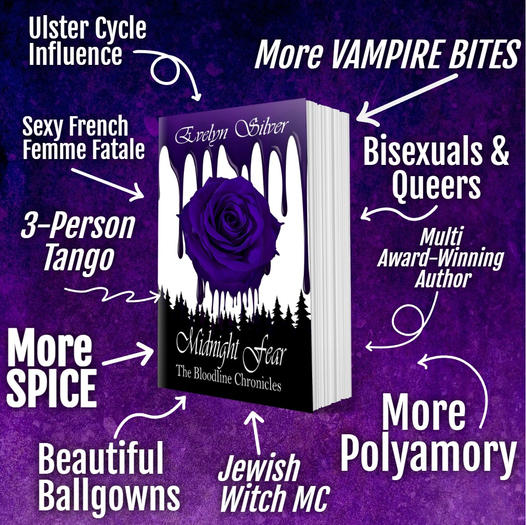
February 27, 2024
Naming Jewish Characters
This was a small side note when I did my article on writing Jewish characters (now available on YouTube!), and all I mentioned was that it’s a Jewish taboo to name a baby after a living family member, but I feel like I missed an opportunity. So, I want to expand on the subject of naming Jewish characters!
I’ve always loved names and naming characters, so this is a topic near to my heart. Names are amazingly fun. They can tell you about a character’s personality, their history, their culture, and their future. Naming is one of a writer’s greatest tools and the very first thing any reader sees about a character. It needs to be done well.
When naming a Jewish character, there’s a lot to consider. There’s meaning, history, legend, language, ethnicity, and time period to take into account.
Hebrew Names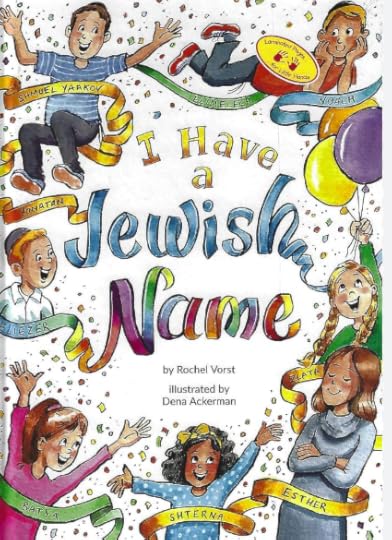
A Hebrew name is used in the Jewish community primarily for purposes of ritual and religion in the diaspora. Some see it as a “real”, if secret, name, with a secular name being a sort of mask society demands, others see it as an additional name, or even a useless name.
An example of when a Hebrew name would be used would be praying for a person’s health if they’re sick or calling a person to the bimah (altar) to read from the Torah in synagogue, such as for a Bar or Bat Mitzvah service or other occasions. A Hebrew first name can be the same as an English name, or it can be very different. Jeffrey might become Arieh and Ashley might be Simcha, but Sarah remains Sarah. Other names like Joseph or Rachel are anglicized versions of Hebrew names and so might become Yosef and Ra/ch/el (with the ch in Rachel being pronounced the same as the ch in Chanuka).
The practice of having separate Hebrew and secular names is not a new one, especially in locations where Jews were an endangered minority. For an ancient example, you can look at the story of Esther. Esther was not originally a Jewish name, but a Persian one. Esther’s Hebrew name was Hadassah, which means myrtle. In the story, she uses the Persian name Esther to hide her Jewish identity to stay safe.
When choosing a Hebrew name for fictional character, be sure to take into account the meaning of the name. For example, Arieh means lion and Simcha means happiness. Many popular Hebrew names that are also words with meanings, usually nature words, are unisex, like Aviv [spring], Tal [dew], and Or [light]. That said, Hebrew is a very gendered language (the word for table is masculine, the word for shirt is feminine, etc.), so names ending in -ah or -t are usually feminine names, such as Liora or Ronit.
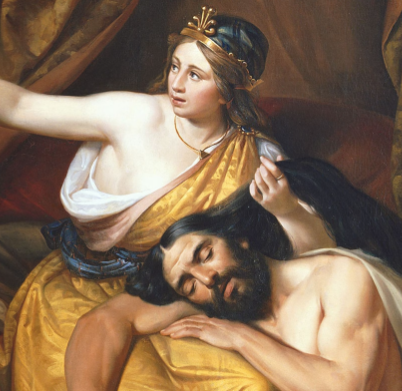
Names with biblical origins are usually not unisex. If you want a name connected to a story in the Torah, be sure to know what the story is, as it can indicate foreshadowing. For example, a character with the Hebrew name Shimshon [Samson, in English] might be destined for tragedy, romantic betrayal, and/or death, especially if he cuts his hair at any point in the narrative. A character named Gideon might be destined to overthrow and kill a king. A character named Rut [Ruth, in English] might be destined for a Cinderella type rags-to-riches romance.
Hebrew names are given by parents to their children as babies or sometimes by a Hebrew teacher assigning a name in a language class if someone doesn’t have one yet. Converts are given the opportunity to choose their Hebrew names. My father, for example, chose the Hebrew name Shlomo, because he wanted to be wise like King Solomon, and Shlomo is the Hebrew version of Solomon.
There is one notable occasion in which someone’s Hebrew name will be changed. Many Jews believe that names hold power. So, if someone receives a diagnosis for something life threatening or they become extremely ill, they might have their Hebrew name changed to either Chaim for a boy or Chava for a girl, as both these names mean “life”. The hope, in this case, is that the name will empower them to survive and live a full life.
A Hebrew last name is simple to do – its simply ben (son) or bat (daughter) Father’s Hebrew name. A less commonly used option sometimes found in Reform or Reconstructionist Jewish communities is the non-gendered mi’beit or mibeit, which means from the house of. So, if my first name is Tzipora, that makes me Tzipora bat Shlomo. In modern times, many less orthodox congregations and traditions will also include the mother’s last name. If my mother’s last name is Or, that would make me Tzipora bat Shlomo ve Or. Tzipora, daughter of Shlomo and Or.
This can be used to add another layer of meaning to your fictional character. Combining the literal meaning and biblical stories, Tzipora bat Shlomo ve Or translates to Bird/Wife of a Prophet, daughter of Wise King/Peaceful person and Light. That’s a lot of meaning and foreshadowing packed in a name like that. The bird part may indicate a desire to be free and fly or it may indicate a singer. Tzipora is also the name of Moses’s wife in the Torah, so there’s a connection to a story to be aware of when using that name. Being the daughter of a wise man or leader whose name means peaceful and the daughter of light indicates an intelligent character with a strong moral compass and capacity for compassion.
Please note if your character is a convert, then their Hebrew last name will be ben/ bat/mi’beit Abraham ve Sarah. This is also used when someone’s parents are unknown, a reference to the belief that all Jews are descendants of the biblical figures of Abraham and Sarah. While this is meant literally for those born into it, its considered more of an adoption into the family for converts rather than a biological connection.
When picking a Hebrew name for a character, be sure it is actually in Hebrew. the Hebrew language has two sounds not in English, the /ch/ sound and tz sound, and also does not have sounds found in English, specifically the letters J and W. Anglicized versions of names will change a Y to a J and a V to a W or B. Don’t use the anglicized versions of names! Joseph, Jacob, Jonathan, and Joshua are not Hebrew, but Yosef, Yaakov, Yonatan and Yehoshua are Hebrew.
Non-Hebrew names for Jewish CharactersFirst names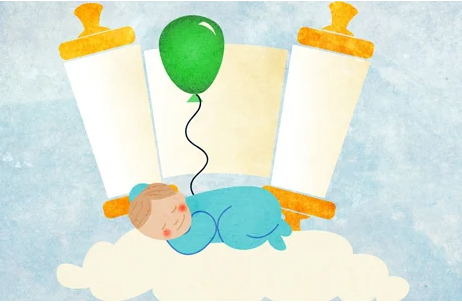
A Jewish character’s secular first name can be almost anything. Take into account your Jewish character’s current country and the countries their family has come from. A woman character with Romanian ties might be named Nadia. A man character in America might be named Jordan. Russian woman might be named Natasha. A non-binary character might name themselves Aspen.
Jewish parents often gave names to their children to help them blend in to avoid discrimination and/or murder. For example, I believe it was either my grandpa or his brother was spared death in Romania because their nickname was a common Romanian non-Jewish name, so they got away from an incident unscathed. Being called Jack instead of Yaakov (the Hebrew version of Jacob) or Joe instead of Yossi or Yosef (Hebrew nickname for and version of Joseph) can literally be the difference between life and death in real life or a story.
Now, do take care not to name a Jewish character something blatantly non-Jewish unless there’s a very good narrative reason. Don’t name them Christian, Christine, Paul, or Mary. Not that it’s impossible for a Jew to be named something like Mary or Paul, but it would be unusual and from a very secular family that gave no shits or didn’t think about the implications and just liked the name. For example, I have known a Jewish woman named Chris (which is a shortened version of the names Christian or Christine). But that’s the real world. When naming a character, you don’t get the luxury of “Oh, I hadn’t thought of that, I just liked the way it sounded.” You need to name characters with intent. Giving a Jewish character in your story a Christian or other religion’s name makes it look like you don’t know what you’re doing. It makes you look ignorant at best, or intentionally white-washing at worst.
Now, a note for some Mizrahi and Sephardi names. Many Arab countries have restrictions on what you are legally allowed to name a child. It was also historically and continues to be extremely dangerous to be Jewish in most Muslim countries. So, Jews who lived in those countries may have Arabic versions of Jewish names. For example, Ibrahim or Maryam instead of Abraham and Miriam. They may also have straight up Arabic names such as Sultana, Suliman, and Amir, and may give these names to their kids even when no longer in a Muslim country simply because they like the name. However, they likely will not be named Muhammad anymore than they would be named Christian or Jèsus.
One quick last thing – Alexander and variants (Alex, Alexis, Alexa, etc) are really popular names, as the Jewish community in antiquity considered Alexander of Macedonia to be a really awesome dude and promised to name their kids after him.
Last names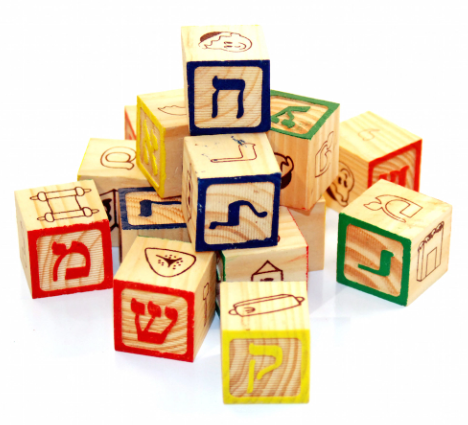
Traditionally, way back when, Jews used patronyms similar to current Icelandic naming conventions. A person’s last name was Ben or Bat [Father’s Name]. Ben or bat, in Hebrew, translates to son or daughter (with son of being implied). However, gradually around the world, governments began mandating Jews register last names and they were assigned them or chose them. Many Jewish last names imply either a location or a profession. For example, Al-Fassi may be a Mizrahi last name meaning from Fez, Morocco. Cantor indicates a family history of being the one who read from the Torah for the community and led singing of prayers (different from a Rabbi). Rabin means a rabbi, or spiritual leader of the community. Last names ending in -stein, -berg, and -ski are common in Ashkenazi families indicating someone who lived on stony ground in a German speaking land (stein), someone who lived near a mountain in a German speaking land (berg/burg), and someone from a Polish or Slavic speaking land (ski/sky, meaning “from”). Also common are -man and -vitch, and maybe some more I’m forgetting. Ashkenazi families didn’t start using set family last names until around the seventeen to eighteen hundreds, so these names are not
particularly old.
Sephardic Jews didn’t start using permanent last names until around the tenth century or so, and it wasn’t mandated that they were required to adopt permanent last names until the Alhambra Decree of 1492 in Spain, which also expelled the Sephardic Jews from Spain. Sephardic may have Spanish sounding last names either more distinctively Jewish such as Hassan or Sedaka, or as an attempt to disguise Jewish heritage or referring to a location, such as Navarro or Sevilla.
I couldn’t find a lot of information on the historic use of last names for Mizrahi Jews, except to say that it was fairly common early on for them to use last names? But I also saw some contradictory information that said they were more likely to use the patronym system? I’m not an expert. Regardless, Mizrahi last names may vary from location to location, but are often either Arabic influenced names such as Salim, or Judaic names, like Abraham. Sometimes they can indicate a profession, such as the Yemeni Jewish last name Naggar (a carpenter).
There are some special last names that are references to the unique position of a family in Jewish religious life. Here, we need to get into Jewish tribes.
Tribes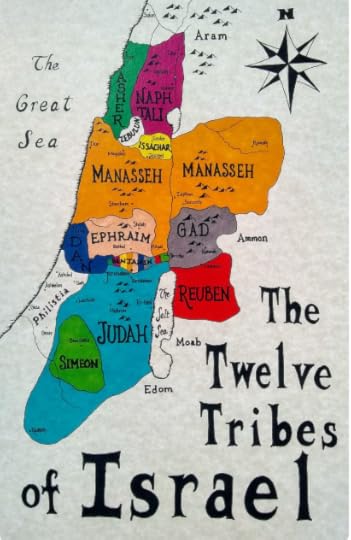
To start the explanation, there were originally twelve tribes, said to be named for the children of Jacob, who was renamed Israel. As such, you get the twelve tribes of Israel. However, one of the sons, Joseph, didn’t get one tribe. Instead, he had two sons and they each got a tribe name, Ephraim and Menashe, due to favoritism. The other tribes are Reuven, Shimon, Levi, Yehudah, Issachar, Zevulun, Dan, Naftali, Gad, Asher, and Benyamin [I used the Hebrew phonetic versions of the names instead of anglicized versions]. Now, if you’ve been counting and noticed that if Joseph was one of the twelve sons of Israel and got two tribes, then there should be thirteen! Well, there are, kinda. My understanding growing up was that there’s two reasons its counted as twelve. One is counting Joseph’s tribes of Ephraim and Menashe as one, despite the split into two. The other is that the tribe of Levi got a special purpose separate from the rest of the tribes, instead of getting land. So, while there were technically thirteen tribes, only twelve had designated territory. The tribe of Levi instead had the honor of assisting the kohenim (priests) in the temple, as a reward for not participating in the golden calf situation in the story in the Torah.
A note: all these names can be used for either a (male) first name, or for last names of Jewish characters. I’ve known several people with the last names Asher, Levi, Menashe, and Benjamin.
After the majority of Jews were expelled from their homeland and dispersed into diaspora populations, the knowledge of who came from which tribe was lost. Gad or Naftali didn’t matter, but since all the tribes are said to be descendants of the man named Israel, everyone became part of the singular tribe of Israel/Yisrael.
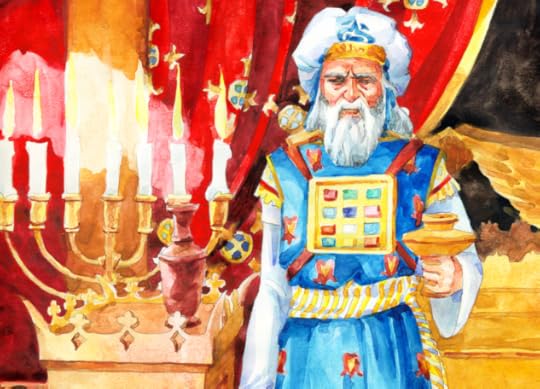
Well, almost everyone. Here’s where we get to the special names I was talking about. See, in modern times, there’s three Jewish tribes you can be born into. Kohen, Levi, or Israel. Those who are Kohens (also spelled Cohens) are descendants of the priests from ancient Israel, who are said to be the descendants of Moses’s brother, Aharon. They’re a Big Deal, religiously. Those who are Levi are also a big deal, though not as big of a deal. To be part of the Kohenim or the Levi’im you need to be born into the right bloodline from your father’s side. While religion is passed from the mother in Judaism, tribe is passed from the father. Everyone who is not a Kohen or Levi is Israel (also spelled Yisrael). This includes those who have non-Jewish fathers or those who
into Judaism. Since my father is a convert, that makes me part of the tribe of Israel.
There are extra rules, religiously, for Kohens and Levis. For example, a Kohen may not marry a convert or a non- Jew or a divorced person or a widow. They cannot enter a graveyard or place where death has touched and they have specific lines and roles to play in religious ceremonies. Levis also have specific lines and roles to play in religious ceremonies. For example, when reading from the Torah, the first aliyah (going up to read a few lines of the Torah, or say the blessing for it before the cantor reads it) must go to a Kohen. Then the second to a Levi. Then the rest can go to anyone, Israel, Kohen, or Levi. There’s some rules about what to do if one or the other isn’t present, but that’s how things are supposed to go if everything goes right.
With such important roles in religious life, these familial ties are indicated in a lot of names. For example, my maternal grandma is a kohen. We know this because her last name before marriage was Goldman. If a Jew has the name Gold, Goldman, Goldstein, Goldberg, or anything to do with Gold, this is an indication that they are likely from a family of Kohens. It refers not to literal wealth or money, but to having a golden heart and sense of justice. In a way, it’s a code to hide behind an westernized name, while indicating to the Jewish community who they are. Many kohens are named Kohen, Cohen, or Cohn. But Gold is also common, as is Katz. Katz is a name that takes the words “kohen tzadik” meaning righteous kohen and abbreviates it to just the first letters. Like Gold, it’s meant to indicate to other Jews a position of religious importance while not sounding too Jewish to the surrounding Christians who might be prejudice. Of course, in modern times, all these names have become commonly associated with Jews, so the secret code isn’t as useful as it might have once been. Tzadik is also a name that can indicate someone is a kohen, and variations can include Zadik or Zadok. A kohen name from Russia might be Kagan, which is a sort of Russianized version of kohen.
There are also names associated with being a Levi. Levi, Halevi (ha’ meaning the in Hebrew), Levine, Levit, Levitte, Levite, Levinson, Levin, Lewin, Lewinsky, and Loewy are some of the more obvious ones. Then there’s Segan or Segel and variations of that name. Kinda like Katz for a kohen, segan is short for segan lekehunah, or second to the priest. Segal and sgan mean, essentially helper, as in sgan Levi, a helper Levi.
Some Jews when, say, going through Ellis Island, had their names changed either as a deliberate choice or by clerks writing things down wrong. Many Jewish families chose to change their names to less Jewish-sounding names to avoid discrimination. For example, Mr. Rabinowitz couldn’t get a job, but Mr. Robins was hired on the spot.
Decolonization of Names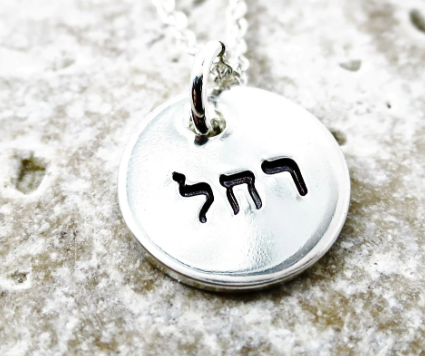
Some Jews in modern times and through the twentieth to twenty-first centuries are going through a process of de-assimilation and decolonization, reclaiming ancestral language in modern ways by changing familiar surnames forced on their ancestors to Hebrew ones, in addition to using Hebrew first names. Some examples may be taking a name like Jacobowitz and changing it to a Hebrew version, such as Yaakovi. It could mean using the name of a mother or father, or an ancestor worthy of honor, as name like Ben-Gurion. It could mean using the name of a biblical character as a last name, such as David. Place names are also an option, such as Eilat, or words with meanings such as Mazal meaning luck or Shalom meaning peace. Sometimes names will be changed to something that simply sounds similar, such as a name ending in -burg/borg/berg being changed to Barak, meaning lightning. This is less common in diaspora communities, but not unheard of.
As a response to this movement of encouraging changes to create a more monolithic Hebrew identity, some Jews have more recently reverted back to their family’s assimilated names (Germanic, Slavic, Arabic, Russian names, and others) as a statement to preserve the beautiful variety found in many distinctive Jewish ethnic identities rather than a pan-Hebrew identity.
ConclusionYour character’s last name will say a lot about their heritage and where they come from. It can convey to other Jews, both characters in your stories and potential readers in your audience, what a character’s tribe is, who their family is, and what Jewish ethnicity they are. It also provides lots of opportunity for you as an author to tell us about your character before they’ve even spoken a word, conveying personality, desires, and even potential plotlines. It’s important to get it right so you don’t convey the wrong information.
Below, I’m placing a list of a handful of Hebrew names. This isn’t a comprehensive list, just some I like, that you’re welcome to use for your characters!
10 Hebrew First Names, UnisexAviv – SpringDaniel/le – God is my judgeGal – waveLiron – my songOr – lightNoam – pleasantnessRimon – pomegranateSivan – the name of one of the monthsShir – songTal – dew10 Hebrew First Names, GirlsAdina – delicate, mother of Leah and RachelDevorah – A bee, also a prophetessIdit – variation of Yudit/JudithLeah – delicate, one of the biblical matriarchsMalka – queenPnina – pearlRivka – she who ties, biblical characterTamara – date palm treeTikva – hopeTova – good (female)10 Hebrew Boy NamesAdam – Earth/first man, biblical characterBaruch – blessingDov – bearEzra – help/helper, biblical prophetGershom – stranger, biblical characterMordechai – Queen Esther’s uncleMoshe – Biblical character, saviorNatan – givenUri – my lightYonatan – god gave a giftIf you enjoyed this post, give a like and follow for more content, and leave a comment with your thoughts. Be sure to check me out on Twitter at @EternalEvelyn, YouTube, or Facebook and check out information on my adult paranormal romance novel series, The Bloodline Chronicles!
Linktree assorted social media available here.
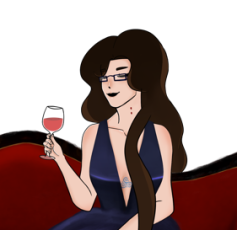
February 5, 2024
Paranormal Romance Guild Reviewer’s Choice 2023 Nominee! – Please Vote!
I have very awesome news! My book, Witch’s Knight, was reviewed by the Paranormal Romance Guild and given not just a glowing 5-star review, but it was also nominated for their Reviewer’s Choice of 2023 Award! While the reviewers nominate the books, votes are how you win.
Please, support my book! Click here to submit your vote. You must be logged into a Google account and you can either search for Witch’s Knight, or scroll down to the category (it’s a bit of a long scroll) of “LGBT/ROMANCE/PARANORMAL/FANTASY/DEMONS & DEVILS & ANGELS/WITCHES & WIZARDS”
Thank you for your support!




 “Secrets, lies, surprises, a major betrayal and F/F sex just added highlights to a story I was already glued to. Bring on book two, I am waiting with bated breath.” – Linda Tonis
“Secrets, lies, surprises, a major betrayal and F/F sex just added highlights to a story I was already glued to. Bring on book two, I am waiting with bated breath.” – Linda Tonis

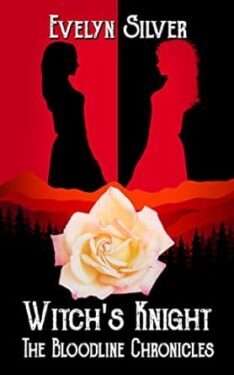
October 9, 2023
Midnight Fear: Release date!
Good news everyone!
Midnight Fear, book 2 in The Bloodline Chronicles, will be released on April 10, 2024.
It will be available for preorder approximately 10 weeks in advance through most book sellers (Amazon, Barnes and Noble, etc) as an ebook and paperback.
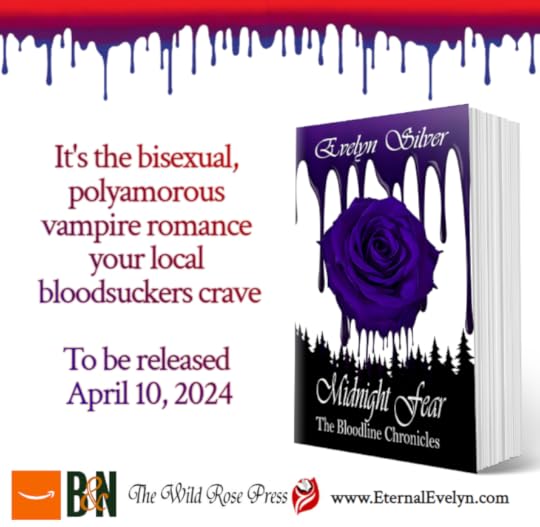
March 23, 2023
Midnight Fear, Book 2 Cover Reveal!
I’ve been busy for a while focusing on a lot of personal developments, but I’m thrilled to be able to bring to you the official cover for my second book in The Bloodline Chronicles, Midnight Fear! Cover art done by Lisa Dawn MacDonald.
The release date is still to be determined, but the cover is simply so delicious I can’t help but share. Additionally, here’s the back-cover blurb about what you can expect in book 2! I promise it’ll be worth the wait… if you thought Witch’s Knight had spice and intrigue, Midnight Fear will more than satisfy your thirst for more.
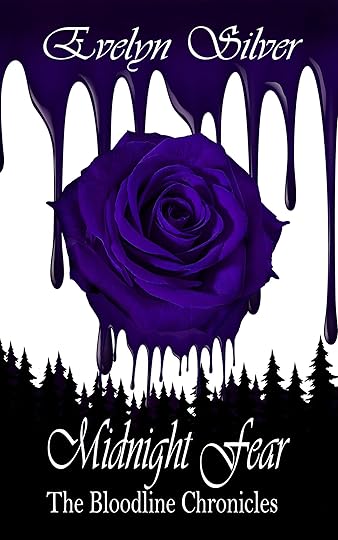
Even the strongest of vampires has a breaking point: for Marcelle de Sauveterre, it was being tortured by a witch in New York and trying to return to her regular existence as if nothing had happened.
She has too much to do to allow herself to focus on something as trivial as trauma. Occult hunters accost her witch allies; an aggravating pyromancer needles a fiery thorn in her side; and the coronation of one of her lovers, the vampire crown prince of New Ulster, Setanta, has her full attention. Not only that, but her newest lover, the necromancer and healing witch Sarai, has trials of her own to face and a reckoning to come with her formal introduction to the vampire royal court at the Midnight Festival. Marcelle and her lovers must face the demons of the past and future, or she may lose the new love she desperately needs.
If you enjoyed this post, give a like and follow for more content, and leave a comment with your thoughts. Be sure to check me out on Twitter at @EternalEvelyn, YouTube, or Facebook and check out information on my adult paranormal romance novel series, The Bloodline Chronicles! Subscribe to my newsletter to keep up with new developments here.
Linktree assorted social media available here.
